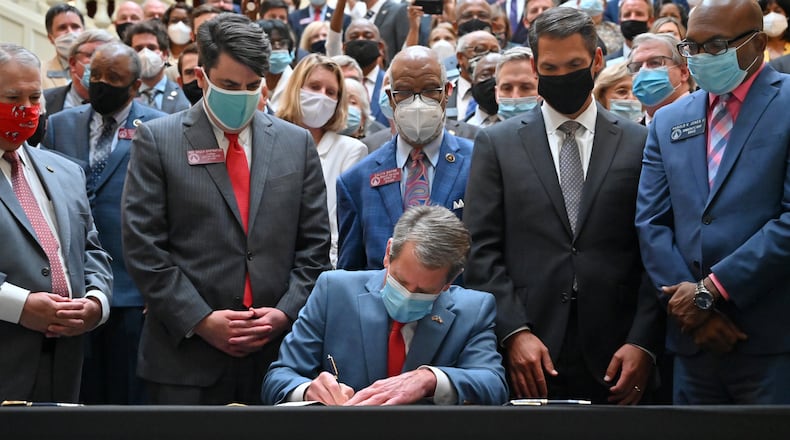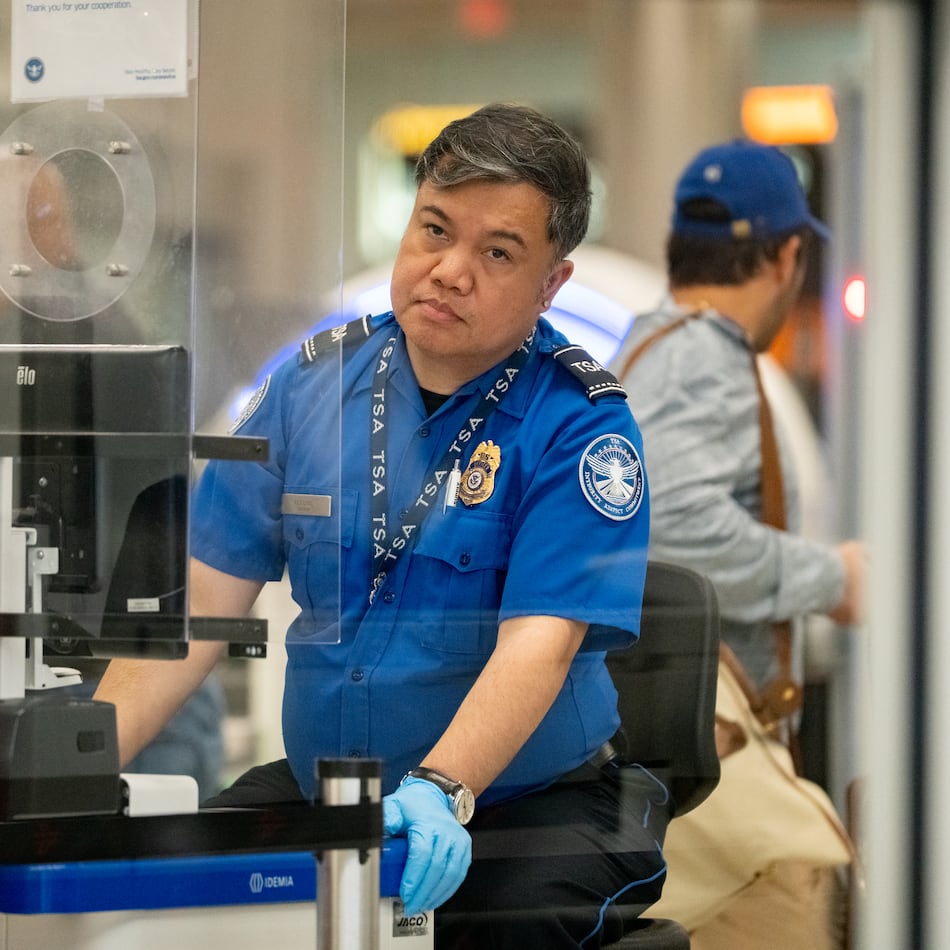It’s time for Gov. Brian Kemp to start warming up his writing wrist. He’s got plenty of bills left to sign before the May 10 deadline.
State law gives the governor 40 days to sign or nullify bills, or let the legislation become law by not taking action.
Although Kemp wasted no time signing Senate Bill 202 in March, and he’s already penned his name on dozens of bills this year from the midyear budget to an overhaul of the state’s citizens’ arrest law, others are still waiting for action.
Among the 2021 bills approved by the state House and Senate that are still waiting on the governor’s desk: An overhaul of Georgia’s citizen’s arrest statute, which he’s expected to sign; an effort to ban local governments from significantly cutting police funding; a sweep of tax breaks; and a rewrite of state campaign finance rules.
Kemp will sign a trio of bills Tuesday targeting human trafficking in the state. The issue has been a priority for First Lady Marty Kemp, who worked with lawmakers to craft and pass legislation and will join the governor in Buford for a signing ceremony.
We talked to Mrs. Kemp when the human trafficking bills were introduced to the General Assembly earlier this year:
“I told Brian, ‘We're going to fight. We're going do what we can to end this here,'" she said.
Unlike most spouses of new governors, she already knew how to put legislation behind a plan and start counting votes.
Her late father, Bob Argo, an Athens Democrat, served in the state House for 10 years alongside several of the legislators who would eventually vote for her legislation.
“I grew up running around these halls," she said. “This is not my first rodeo."
The governor has not vetoed a bill yet this year, but a veto is hardly unheard of. He turned down four Assembly-passed measures following the 2020 session, and 14 in 2019.
Stay tuned as we follow what the governor does, or doesn’t, sign next.
***
A few weeks ago, we documented the embryonic stages of the pro-Trump ticket to compete in Republican primary challenges up and down the ballot.
And though former Rep. Doug Collins was a favorite of the Trump crowd, his decision not to run for the U.S. Senate doesn’t mean the Georgia GOP is suddenly spurning the former president.
It’s true that Collins’ decision deprives Republicans of another big-name candidate in the wide-open race against Democratic Sen. Raphael Warnock. But he wasn’t even Trump’s first choice for the race; he wanted Collins to run for governor.
Instead, the Mar-A-Lago crowd has pushed Georgia football legend Herschel Walker — who now lives in Texas — to run for the seat. And the other would-be contenders each plan to put loyalty to Trump at the middle of their platform.
Elsewhere on the ticket, pro-Trump Republicans still reign supreme. Gov. Brian Kemp has so far avoided a serious primary challenge — and has avoided saying anything negative about Trump, who has promised to support a rival.
Lt. Gov. Geoff Duncan is so damaged by his falling-out with Trump that he’s not even planning to run for re-election; the Republicans lining up to succeed him all have pledged their fealty to the former president.
Secretary of State Brad Raffensperger enters his re-election bid as the overwhelming underdog after Trump endorsed U.S. Rep. Jody Hice for the seat. Internal Republican polls we’ve seen have Raffensperger in real trouble.
***
Like the end of a great Disney movie, Doug Collins gave his Twitter followers the news first: “This is goodbye for now, but probably not forever.”
Along with announcing that he won’t run for any office in 2022, Collins singled out just one area of policy to highlight from his many years in the House: Criminal justice reform.
“I was able to accomplish a great deal for the folks I represent, including historic criminal justice reform with the passage of the First Step Act,” he wrote.
As an attorney and chaplain, Collins was a natural lead on the legislation that was also championed by Jared Kushner and signed by former president Donald Trump in 2018. The law expanded programs for compassionate release, reformed sentencing to reduce recidivism, and even prohibited the use of restraints on pregnant prisoners.
But in their bitter primary fight, Republicans and Kelly Loeffler pointed to Collins’ work on the bill to paint him as essentially soft on crime, while Loeffler “took immediate action to restore law and order to our communities.”
Loeffler beat Collins in the race, but with his statement Monday, Collins got the last word.
***
Big, but not big enough. That was the headline for Georgia out of the U.S. Census Bureau Monday, which released the results of the 2020 Census related to the decennial reapportionment process.
Although Georgia gained 1,024,255 new residents since the 2010 Census, the state’s number of Congressional seats will remain steady at 14. Other states, including Florida, Texas, and Montana, will add seats to their Congressional delegations, while states like California and New York will lose seats based on their shrinking number of residents.
Overall, the population of Georgia grew 10.6% and sits at 10,711,908 residents.
***
With the initial reapportionment decided, states can now move on to redistricting, the process in which legislatures or state commissions redraw the boundaries for state and federal elected positions.
A Politico piece on what’s ahead features a huge photo of Georgia U.S. Rep. Lucy McBath under the headline, “Redistricting kicks off ruthless year of House infighting.”
The piece details all the ways state legislatures can make life more difficult for the party out of power during redistricting, including Democrats in Georgia:
“In Georgia, Democrats are already bracing for the prospect that they will be left with only one winnable seat in the suburbs north of Atlanta, where Reps. Lucy McBath (D-Ga.) and Carolyn Bourdeaux (D-Ga.) live. Republicans have trifecta control in Georgia and could create a deep blue seat based in Gwinnett County, leaving the other seat skewed heavily Republican."
But in a piece by Maya Prabhu for the AJC, GOP state Senate Majority Leader Mike Dugan says it’s way too early to know how the process in Georgia will end up until more specific data comes in.
“I’m not going to speculate,” he said of imagining what a redistricting legislative session might look like this fall. “We need to wait until we get the numbers because this is not something you should play guessing games with.”
***
If you have a burning question for Sen. Raphael Warnock, this week is your chance to (maybe) ask it.
Warnock is holding an online town hall event Friday. The Zoom call will be livestreamed on the senator’s Facebook and Twitter pages. In a release, his office said, “Georgia residents are strongly encouraged to submit questions to be read aloud and answered directly during the town hall.”
***
Those shadows you see in Georgia are the looming presence of presidential hopefuls suddenly interested in making a positive impression in our Battleground state.
First up this week is White House aspirant Sen. Tom Cotton, R-Arkansas, who will join Gov. Brian Kemp for a “virtual meeting” and Zoom event Wednesday night at 8:00.
The Cotton-curious among you can sign up through the Kemp campaign webpage.
***
Finally, did you know Jolt readers are also some of our favorite tipsters? Send your very best political tips, scoops and gossip our way to patricia.murphy@ajc.com.
The Latest
Featured





